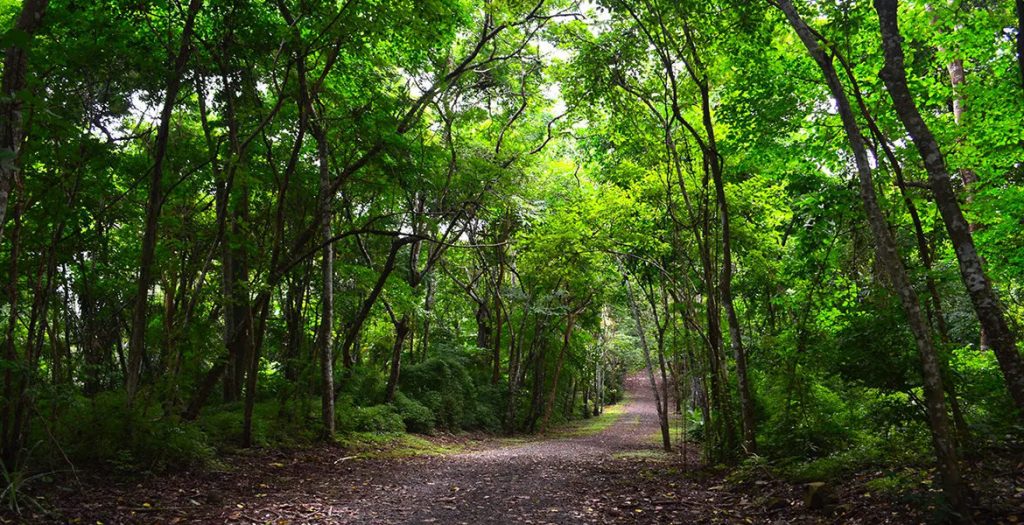
The Metropolitan Natural Park, of little more than 232 hectares, is located just twenty minutes north of the center of the Panamanian capital, in the middle of the vague border that once separated the metropolis from the old Panama Canal zone, administered by United States of America until the end of the 20th century.
Despite the proximity of the Metropolitan National Park to the capital city, it is the habitat of 227 species of birds, 45 mammals, 36 kinds of snakes and 14 kinds of amphibians, being a protected area in Central America.
Approximately 75% of the park is covered by Pacific tropical dry forest, an ecosystem that has almost disappeared in other regions of the country.
In the park there is a variety of birds and vertebrates typical of the tropical humid forest, such as: the marmoset monkey, the ñeque, macaws, squirrels, among others. In addition, it has four main nature trails from where you can see its forests, landscapes and a panoramic view of the capital city from its viewpoint.
The Los Momótides, Los Caobos, Los Robles, La Cieneguita and Camino del Mono Tití trails offer visitors an insight into the beauty of nature and show the life cycle within a tropical forest which is home to 284 species of plants with 80 families and 228 genders.
The forests of the Metropolitan Natural Park present a transition zone between the tropical humid forest and the premontane dry forest, considered as a lowland semi-deciduous forest, being a buffer zone for wildlife.
Each visitor will be able to enjoy a place for recreation, interpretation of nature, environmental education and conservation from the Metropolitan Natural Park.
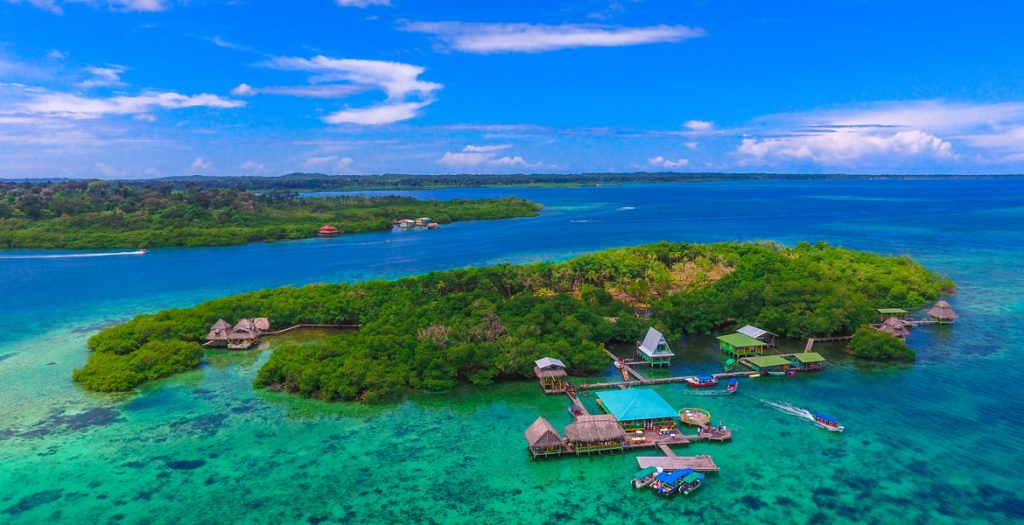
Bocas del Toro is considered one of the best ecotourism destinations in Panama, offering beach, nature, adventure and history and represents the striking Caribbean culture of the country.
From the city you can travel by plane or by land. The trip by bus or car from the city to the port of Almirante takes approximately 9 hours, followed by a boat trip to the city of Bocas on Isla Colón. If you want a faster option, you can take flights from the Marcos A. Gelabert airport to Isla Colón (45 minutes). Isla Colón is the largest island in the archipelago and offers a wide range of hotels, followed by Bastimentos and Carenero.
This Caribbean archipelago is made up of 9 islands, more than 50 cays and innumerable islets and has some of the largest rainforests in Central America.
The climate of Bocas del Toro is tropical with an average annual temperature of 27°. It houses 95% of the Caribbean coral species with turquoise waters, pleasant temperatures and the best waves in Panama to please sea lovers.
Some of the most common species in the area are monkeys, birds, sloths, red frogs, sunfish, starfish, nurse sharks, dolphins, red and white mangroves, among others.
The Bocatoreña region is also recognized for its gastronomic offer, based mainly on seafood. In Cayo Coral, as in Isla Colón, you can find Caribbean, Mediterranean, Italian, Mexican and Indian dishes.
Without a doubt, the Caribbean region is ideal for those looking to have a more unforgettable vacation with the exuberant nature of Bocas del Toro.
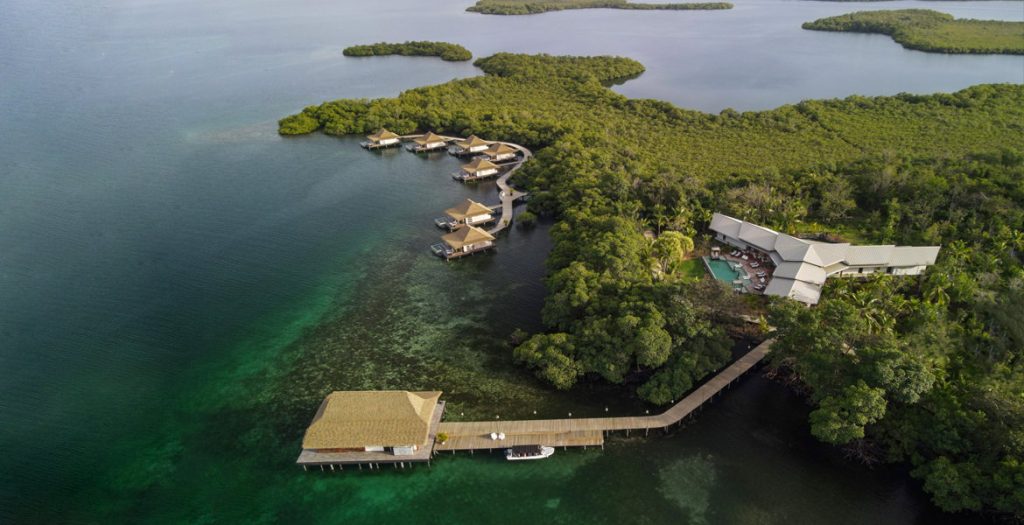
Bocas Bali, Panama’s private island luxury retreat, reveals the world’s first elevated overwater beach. Located on Frangipani Island in Bocas del Toro, a private island off the Caribbean coast of Panama, is a recently opened exclusive resort featuring 16 luxury overwater villas.
It is a simple one-hour regional flight from Panama City to Bocas Del Toro, and a fifteen-minute boat ride to Bocas Bali where you can find the only over water resort in the world that has a lively island town within sight and a short boat ride away.
Frangipani Island has nine acres of dry land, over eighty acres of mangrove, and 3.1 miles of shoreline which is perfect for kayaking.
Bocas Bali was created to be the western world’s ultimate boutique luxury vacation destination. You no longer need to travel to Bora Bora, Tahiti, or the Maldives to experience an exotic private island vacation with over the water villas on stilts.
The majestic Elephant House Restaurant and Bar is a 100-year-old structure shipped halfway around the world from Bali, Indonesia. The second restaurant The Coral Café and Bar is named after the fragile coral that surrounds the island.
All building and overwater structures are specifically placed to avoid interference with the coral surrounding the private island.
Sustainable luxury is at the core of Bocas Bali and the protection of natural elements and marine life were crucial in its creation. The resort team also has five environmental studies to guarantee the protection of the mangrove and the care of its crystal clear waters.
Kupu-Kupu Beach features a white-sand beach lined with lush palm trees, stylish lounge chairs, and the Tipsy Bar serving refreshing cocktails and light meals.
A series of green quartz tiled stairs cascade down into the crystal clear waters, allowing guests to step into the sea without disturbing the natural mangroves that surround the island.
Imagine having only six steps from your bed to your choice of a pool or the sea, the warm breeze, virtually every evening of the year, taking you away to another world.
Only six steps from the bed and you will find a pool or the sea, Bocas Bali experience will take you away to another world.
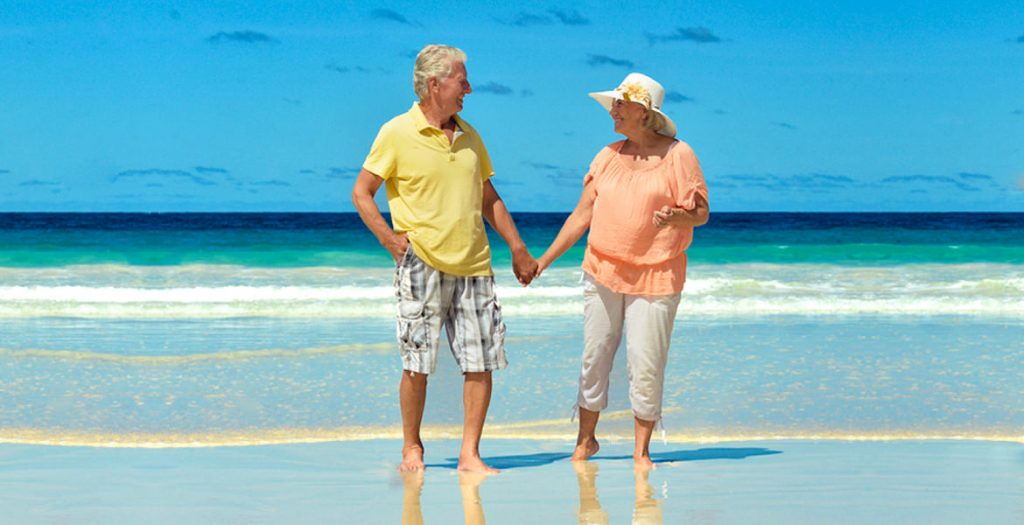
International Living reported that Panama is a country that enjoys an excellent geographical position, a climate far from the hurricane belt, bathed between two oceans, many areas with mountains and vegetation, one of the expatriate sites with the sunniest areas despite a high humidity and rain.
During the 2021 edition, Panama occupied the second position, while Costa Rica led the ranking. Panama climbed a step and was selected in the 2022 edition by International Living, as the best destination for Americans to enjoy their retirement.
With 86.1 points International Living Magazine place Panama in the #1 position to guide retired American explorers to the best countries to visit and for investments.
In the list of best destinations, Panama is followed by: Costa Rica, Mexico, Portugal, Colombia, Ecuador, France, Malta, Spain and Uruguay, in order of importance.
Regarding the cost of housing, benefits and discounts, residence options and, of course, recreation for retirees, Panama is at the head of said list, followed by three other Latin countries where retirees can acquire properties abroad and enjoy unique lifestyles.
Panama makes everything much easier for older adults, it offers stability, economic ease, good cost of food products, quality of medical care and ease of residence regardless of the country of origin.
So this country is definitely the best to live in when you have reached advanced age.
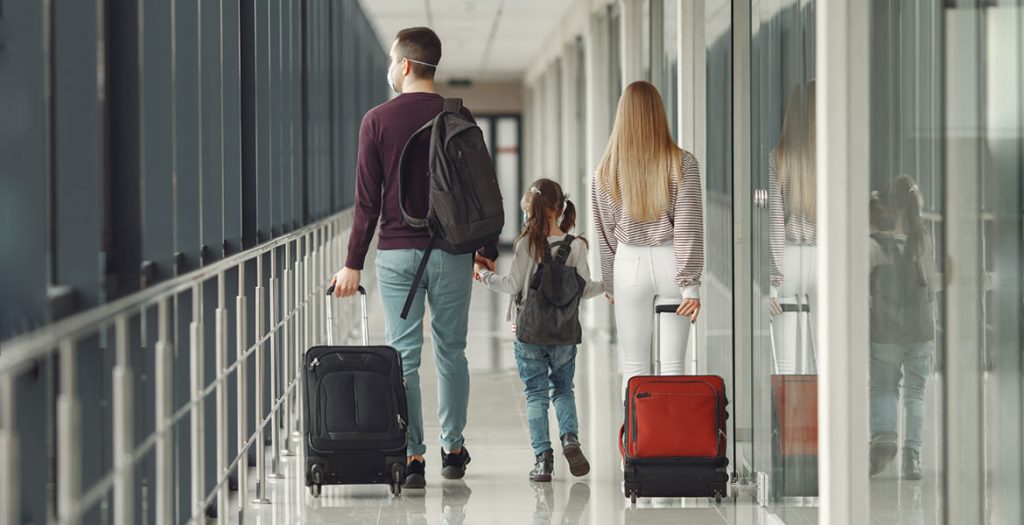
Panama’s borders are open for international travelers, keeping the safety and health of tourists and locals a priority.
Travelers from any country can visit Panama. However, unvaccinated travelers or visitors with only one dose of the vaccine must present a negative COVID-19 test to enter the country for a maximum of 72 hours upon arrival in Panama.
Travelers will not have to present a negative COVID-19 test to enter as long as they can present a card or digital certification of at least 2 doses or a complete vaccination schedule endorsed by WHO, EMA and FDA, 14 days or more after your last dose.
Any child or young person under 17 years of age will not have to present a negative COVID-19 test or complete vaccination record if they are accompanied by an adult when entering Panama.
If it is not possible to present a test within the established period, the traveler must take a rapid COVID-19 test at the airport, which will be paid by the traveler, prior to passing through migration (Value USD $50).
ALL travelers must present to the airline their complete Affidavit of Health (in physical or digital form) BEFORE boarding for Panama (Sworn Declaration of the Traveler)
If the test gives a positive result, the Ministry of Health will assign a stay in a Hospital Hotel for a period of 7 days. The cost of the stay must be fully covered by the traveler.
During your visit:
It is not necessary to wear masks outdoors or in outdoor activities.
The use of a mask is only mandatory indoors, regardless of vaccination status.